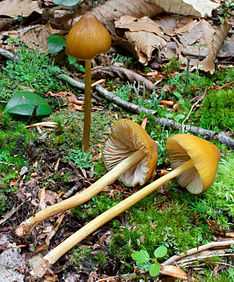Entoloma luteum
| Entoloma luteum | |
|---|---|
 | |
| Scientific classification | |
| Kingdom: | Fungi |
| Division: | Basidiomycota |
| Class: | Agaricomycetes |
| Order: | Agaricales |
| Family: | Entolomataceae |
| Genus: | Entoloma |
| Species: | E. luteum |
| Binomial name | |
| Entoloma luteum Peck (1902) | |
| Synonyms[1] | |
Entoloma luteum is a mushroom in the family Entolomataceae. It was described in 1902 by mycologist Charles Horton Peck.[4] Found in North America, it fruits singly or in clusters on the ground in mixed forest. Its angular spores are non-amyloid, hyaline (translucent), and measure 9–13 by 8–12 µm. Entoloma murrayi is a lookalike species that has a more orange cap with a pointy umbo.[5]
See also
References
- ↑ "GSD Species Synonymy: Entoloma luteum Peck". Species Fungorum. CAB International. Retrieved 2014-08-08.
- ↑ Smith AH. (1953). "New and rare agarics from the Douglas Lake region and Tahquamenon Falls State Park, Michigan, and an account of the North American species of Xeromphalina". Papers of the Michigan Academy of Sciences 38: 53–87.
- ↑ Baroni TJ, Halling RE. (2000). "Some Entolomataceae (Agaricales) from Costa Rica". Brittonia 52: 121–35. doi:10.2307/2666502.
- ↑ Peck CH. (1902). "Report of the State Botanist (1900)". Annual Report on the New York State Museum of Natural History 54: 131–99.
- ↑ Roody WC. (2003). Mushrooms of West Virginia and the Central Appalachians. Lexington, Kentucky: University Press of Kentucky. p. 195. ISBN 978-0-8131-9039-6.